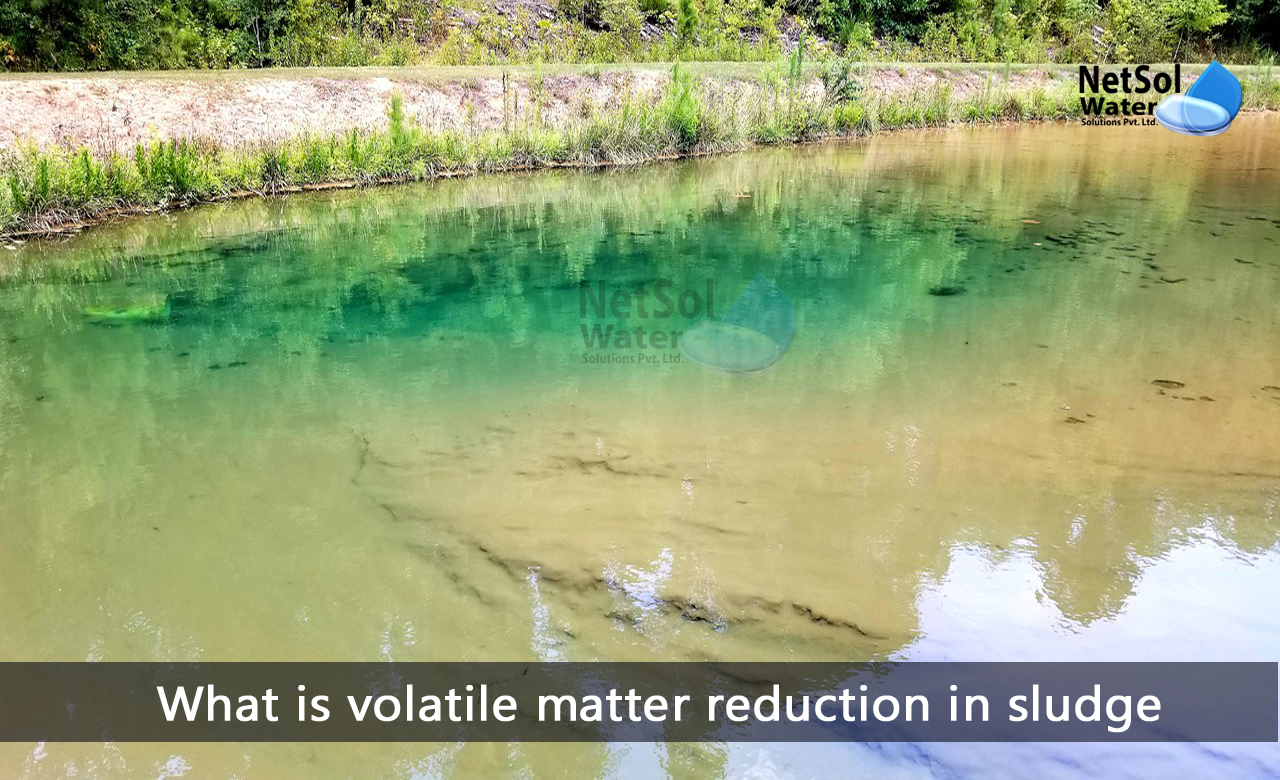Sludge quality can be determined by measuring solids concentrations in different tanks, performing solids inventories, or calculating sludge-return and wasting flow rates.
Let’s see how volatile matter is reduced in sludge.
What is volatile matter reduction in sludge?
In the activated-sludge process, solid quantities and concentrations are measured in order to achieve balance, or a correct ratio for the food amounts — organic solids or BOD — entering the treatment system and the bacteria amounts, available to eat it.
This "F/M" balance or ratio affects process performance, with "F" representing the amount of food entering the process, and "M" representing the amount of bacteria in the system. Bacteria must be present in sufficient numbers to handle food entering the system.
Another reason to analyse concentrations is to determine the thickness of the sludge, and the flow rate returned from the final clarifier to the treatment system.
Methods to measure the concentration of solids
The total-suspended solids (TSS) method, which measures the concentration of solids in activated sludge samples, is one method for measuring concentration. It is widely accepted and measures actual suspended-solids concentrations, accurately and precisely.
Because, settling is not required, problems caused by differences in sludge sample settleability are avoided.The volatile suspended solids (VSS) method determines the concentration of solids, in activated sludge samples by measuring volatile solids. Because, bacteria are mostly organic, the VSS test is a better predictor of organic-solids concentrations, and thus the number of bacteria in a sample.
Calculation of TSS and VSS solid quantities
The concentrations of TSS and VSS solids are typically expressed in milligrams per liter (mg/L). This concentration data is used to calculate amounts in a basin or flowing into or out of "something", in pounds of solids or pounds per day of solids.
Let's see how to convert a concentration in mg/L to a weight in pounds (lbs). This conversion has the following formula:
Lbs = Volume (MG) X TSS Concentration (Mg/L) X 8.34
The calculation would be the same if we determined the solids concentration in Mg/L of VSS, and substituted the VSS concentration for the TSS concentration. The end result would be pounds of VSS rather than pounds of TSS. VSS as 75% of TSS is an example of their ratio.
To calculate the concentration of settled sludge
If we know the settle-ability of mixed liquor, we can use it to measure solids settling and observe settling concentrations.
It is useful to record settled sludge volumes (SSV) while performing the settle-ability test.
Plotting the settle-ability values on a curve reveals that the sludge volume settling, in the Settleometer decreases over time. TSS or VSS concentration measurements, as well as visual observation of settling sludge, show increases in sludge-blanket solids concentration.
Settling Information
Settling information is critical for operators of activated sludge processes. Sludge quality, on the other hand, can be defined as the relationship between SSV and either TSS or VSS.
Normal Settling
A "normal" settling, high-quality activated sludge from a traditional activated-sludge process, may reach ultimate compaction — that is, it stops settling — in one to two hours.
Rapid settling sludge
Rapid-settling sludge is over-oxidized sludge that reaches its endpoint concentration in less than an hour. Rapid-settling sludge is undesirable because it allows pin floc and other solids, from the sludge blanket to escape. These solids are then disposed of in the plant's effluent. Slower settling sludge produces consistently higher quality effluent.
Old, slow-settling sludge
It is dark brown and settles much faster when diluted. Diluting is the use of equal parts sample and water. Any foam that is present will be brown and scummy-greasy in appearance.
Young, slow-settling sludge
It is light-brown to tan in color and settles at the same rate whether diluted or not. Any foam that is present will be white and crispy in appearance.
How can we assist?
Netsol Water works with a diverse range of international organizations, to address complex water and wastewater issues by strategically integrating cutting-edge wastewater treatment technology, with pract?ical solutions.
We customize our wastewater treatment systems to meet the specific needs of our customers, at an affordable price. To meet our customers' needs, we provide fully automated and semi-automated systems.
Netsol Water is Greater Noida-based leading water & wastewater treatment plant manufacturer. We are industry's most demanding company based on client review and work quality. We are known as best commercial RO plant manufacturers, industrial RO plant manufacturer, sewage treatment plant manufacturer, Water Softener Plant Manufacturers and effluent treatment plant manufacturers. Apart from this 24x7 customer support is our USP. Call on +91-9650608473, or write us at enquiry@netsolwater.com for any support, inquiry or product-purchase related query.



